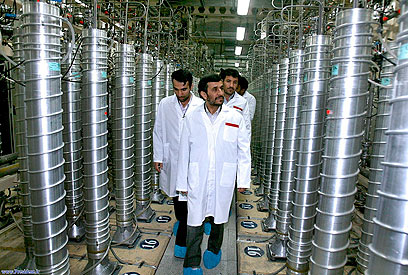
Iran warns region against 'dangerous' stance on Hormuz
FM Salehi says Islamic Republic wants 'peace and tranquility' in region; Chinese premier defends extensive oil trade with Tehran
Iran's Foreign Minister Ali Akbar Salehi said on Thursday that Tehran had never tried to block the Strait of Hormuz but warned its neighbors against putting themselves in a "dangerous position."
"We want peace and tranquility in the region, but some of the countries in our region, they want to direct other countries 12,000 miles away from this region. I repeat that Iran has never tried to hinder this important route," Salehi, in Turkey on a visit, told Turkey's NTV broadcaster.
"I am calling to all countries in the region, please don't let yourselves be dragged into a dangerous position."
Related articles:
- Op-ed: Beware Iranian desperation
- Report: EU set to agree on Iran oil embargo
- US concerned over Israeli strike in Iran
Salehi added the United States should express it is open for negotiations with Tehran without conditions, referring to a letter Iran says it has received from the US government about the Strait of Hormuz situation.
Meanwhile, Chinese Premier Wen Jiabao defended his country's extensive oil trade with Iran against Western sanctions pressure in comments published on Thursday, and yet also warned that Beijing firmly opposes any efforts by Tehran to acquire nuclear weapons.
Wen spoke on Wednesday at the end of a six-day visit to the Middle East against a backdrop of tensions over possible US sanctions on nations that do energy trade with Iran, which Western powers say is focused on developing nuclear weapons.

Ahmadinejad at Natanz uranium enrichment plant (Photo: AP)
Iran has insisted that its nuclear goals are peaceful, and in late December threatened to punish the latest Western sanctions by choking off oil flows through the Strait of Hormuz, a vital route for much of the Middle East's oil exports.
Wen said his government "adamantly opposes Iran developing and possessing nuclear weapons," and warned against potential confrontation in the Strait of Hormuz.
Beijing officials are usually much more coy about even suggesting that Iran could be seeking nuclear arms.
Speaking at a news conference in Doha, Wen also took aim at both potential threats to China's oil imports: the US sanctions pressure and the Hormuz tensions.
"I also want to clearly point out that China's oil trade with Iran is normal trade activity," he said in
response to a question about US and European efforts to curtail Iranian oil exports and revenues, according to a transcript on the Chinese Foreign Ministry's website.
"Legitimate trade should be protected, otherwise the world economic order would fall into turmoil," he added.
But Wen shrugged off worry about China's oil needs.
"I don't have this or that worry about China's oil supplies, and this time I didn't discuss this issue with the leaders of each country," he told the news conference, according to the official Chinese transcript.
Wen visited Saudi Arabia, the United Arab Emirates and Qatar.
His comments laid bare the tricky course Beijing is trying to steer between pressure from Washington and its allies and expectations from Iran, which looks to China as a sympathetic power and its chief oil customer.
The tensions are a particular worry for China, the biggest buyer of Iranian oil, followed by India and Japan. Only Saudi Arabia and Angola sell more crude than Iran to China.
"We believe that, no matter what the circumstances, the security of the Gulf of Hormuz and normal shipping passage through it must be guaranteed, because this is in the interests of the whole world," said Wen.
"Any extreme measures on this issue would violate the wishes of all countries in the world and their people."
The Obama administration last week invoked US law to sanction China's state-run Zhuhai Zhenrong Corp, which it said was Iran's largest supplier of refined petroleum products.
The United States is also working out how to enforce a law enacted on Dec. 31 that targets foreign financial institutions doing business with Iran's central bank, notably to buy crude.
China has backed UN Security Council resolutions calling on Iran to halt uranium enrichment activities, while working to ensure its energy ties are not threatened.
In the first 11 months of 2011, Chinese crude imports from Iran were at about 553,000 barrels per day, a gain of nearly 30% on the same period a year before, according to Chinese customs data.
- Receive Ynetnews updates directly to your desktop










